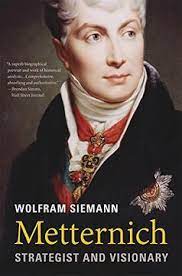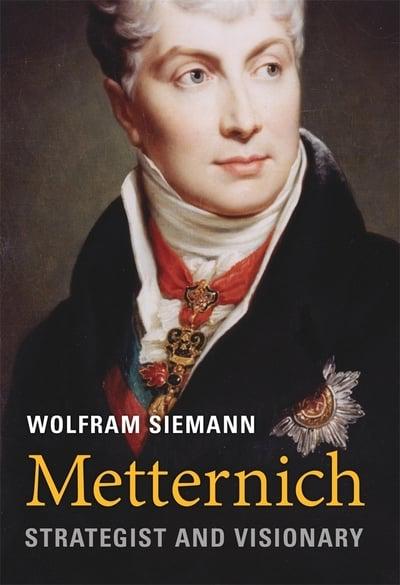Metternich
strategist and visionary
- ISBN: 9780674292185
- Editorial: The Belknap Press of Harvard University Press
- Fecha de la edición: 2023
- Lugar de la edición: Cambridge (MSS). Estados Unidos de Norteamérica
- Encuadernación: Rústica
- Medidas: 24 cm
- Nº Pág.: 928
- Idiomas: Inglés

Metternich is often portrayed as the epitome of reactionary conservatism, a ruthless aristocrat who used his power to stifle liberalism and oppose the dreams of social change that inspired the revolutionaries of 1848. But in this landmark biography, the first to make use of state and family papers, Wolfram Siemann paints a fundamentally new image of the man, revealing him to be more forward-looking and nimble than we have ever recognized.
Clemens von Metternich emerged from the horrors of the Revolutionary and Napoleonic wars committed above all to the preservation of peace. As the Austrian Empire's foreign minister and chancellor he was, as Henry Kissinger has observed, the father of realpolitik. But short of compromising on his overarching goal, Metternich aimed to accommodate liberalism and nationalism. Siemann draws on previously unexamined archives to bring this dazzling man to life.
Hailed as a masterpiece of historical writing, Metternich is indispensable for understanding the forces of revolution, reaction, and moderation that shaped the modern world.
Introduction
A Life in Seven Stages
Metternich’s Biographers across the Generations
The Risks and Limitations of Srbik’s Biography of Metternich
1. Origins: Family Ties and the Rise of the Metternichs
The Ministerial Metternichs
The Lords of Königswart
The Barons of Winneburg and Beilstein
The Counts as Members of the Imperial Diet
The Highest Floor: The Princes in the Bel Étage
2. Metternich’s Generation: Ancien Régime and Enlightenment, 1773–1792
Parental Home, Childhood, and Education
Studies in Strasbourg and Mainz: Formation of a Political and Historical View of the World
3. A Double Crisis: Empire and Revolution, 1789–1801
Fin de Siècle: The Imperial Elections of 1790 and 1792
1789: The Rupture of the French Revolution
Brussels and the Austrian Netherlands
The Journey to Great Britain: The Final Piece to the Young Metternich’s Political Universe
Collapse and Flight in 1794
A New Beginning: Vienna, Königswart, and Austerlitz
Time of Transition: The Diplomat in Waiting, 1796–1801
4. Between Peace and War: Life as an Ambassador, 1801–1806
Dresden, 1801–1803: The Minister at His “Observation Post”
Berlin, 1803–1806: The Ambassador on the Grand Diplomatic Stage
The Peace of Pressburg and the Beginning of the End for the Holy Roman Empire
5. World War: Outset and Intensification, 1806–1812
Ambassador in Paris, 1806–1809: In the “Lion’s Den”
Ambassador on Borrowed Time and Napoleon’s Captive under House Arrest
The Interim Minister: Sidelined by Napoleon
The Minister in Charge of the New Direction: A Defensive Strategy in Domestic Policy and Matchmaking Abroad, 1809–1810
The Foreign Minister on Tour: 181 Days with Napoleon
Domestic and International Consolidation, 1810–1812
6. World War: Climax and Crisis, 1813
Metternich Discreetly Assembles the Forces
The Tactical Path to an “Armed Mediation”
Austria Joins the War: The Quadruple Alliance
7. World War: Catastrophe and Resolution, 1814
The Final Battle against Napoleon and the Prefiguration of the Vienna Order
Metternich’s Second Voyage to England and the Preparations for the Congress of Vienna
Metternich, the War, and Violence in Politics
8. The End of an Era and a New Beginning for Europe: The Congress of Vienna, 1814–1815
The Initial Situation: The Experience of War and a Legal Vacuum
The “Cosmopolitans”: Instigating a New Law Based on Imperial Legal Orders
A Master Plan? Metternich between Realpolitik, Strategy, and Vision
The Congress on the Brink: Crises Test the Principle of Balance
The End the Holy Roman Empire: The Habsburg Empire and the German Question
“Germany—United by Federal Ties”: Metternich’s Part in the Foundation of the German Confederation
“The Congress Dances”—Especially in Metternich’s House
9. Connoisseur of Women and Head of the Entail
Iconography and Historical Specificity of Love
Love and Politics: At the Courts of Dresden, Berlin, and Paris
Wilhelmine von Sagan and the Confusion of Feelings
Dorothea von Lieven: “The Nearness of the Beloved”?
Wives and Children: Family Ties and Tribulations
10. The Construction of a New Beginning: Reform and Reconstruction, 1815—1818
Metternich’s Ideas and Policies on the Nationality Question: The Case of Italy
Journeys to Italy, a Happy, Ungovernable Country
Metternich’s Plan for a Reorganization of the Monarchy
Habsburg and the German Confederation: An Affirmation for Metternich and Prussia, 1817—1818
11. Defensive Security Policies: Averting Threats under the Vienna System, 1815—1829
Napoleon’s “Hundred Days”: Activating the European Security System
Fault Lines in the Societies of Europe after 1815
Metternich and British Security Policies, 1817–1820: Pretext or Defense against a Revolution?
The Radicalization of the German National Movement: The Wartburg Festival and Sand’s Assassination of Kotzebue
Metternich’s Hesitant Reactions: The Press, the Professors, and the Students
From Teplitz to Carlsbad: The Conferences on Domestic Security, 1819–1820
Metternich’s Suggestions for the Development and Extension of the German Federal Constitution: The Final Act of the German Confederation, May 15, 1820
Terrorism and Security Policies as a European Problem: England, France, and Metternich
A Double-Edged Sword of Intervention and the Concert of Europe
The Concert of Europe and the Defensive Security Policies of the 1820s
12. The Economist: Metternich as a Capitalist with a Social Conscience
Managing Financial Crises
Metternich as Agrarian Economist: Farmer, Vintner, Forester
Factory Owner and Industrial Entrepreneur
13. The Spring of Nations amid Poverty, 1830–1847
The July Revolution in 1830 and Metternich’s International Crisis Management
A Revolution in Communication, the Spring of Nations, State Security
Tolerated Revolutions after 1830
From the Orient to the Rhine: The Concert of the Major Powers as a Challenge
Metternich and Customs Policies
14. The Organization of Rule: Power Centers, Networks, Interests, Intrigues
The Master of the State Chancellery
Constrained by Emperor Franz’s “Personal Regime”
Emperor Franz’s Legacy: A System “Headed by a Half-Wit Who Represents the Crown”
Crisis Instead of Reform: Metternich versus Kolowrat
Lobbyism, the Power Politics of the Imperial Family, the Estates
15. Revolution, Escape, Exile, 1848–1851
Revolution 1848: “Sheet Lightning,” Outbreak, and Escape
Metternich’s English Self: In Exile, 1848–1849
Brussels 1849–1851: Metternich’s Look Back at a Liberal Economic Policy That Was Not to Be
16. At the Observatory: Twilight Years in Vienna, 1851–1859
Epilogue: Metternich as a Postmodern Character in Early Modernity







